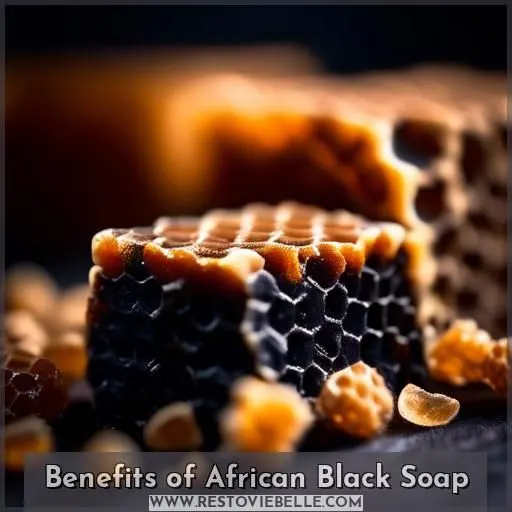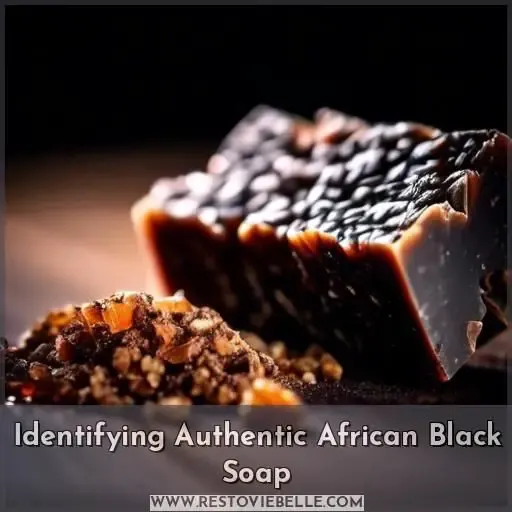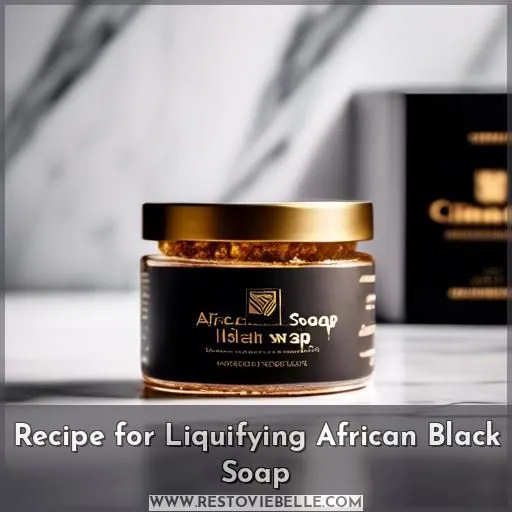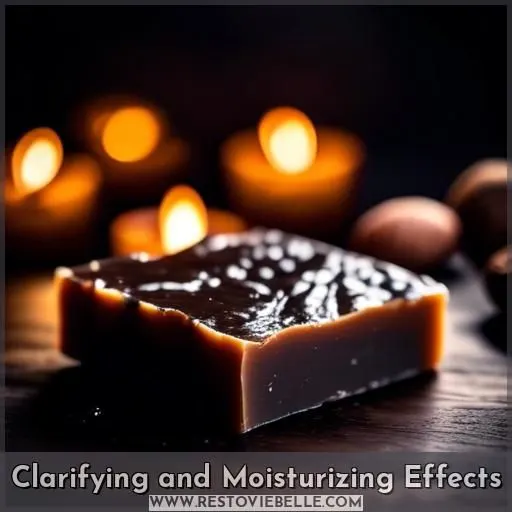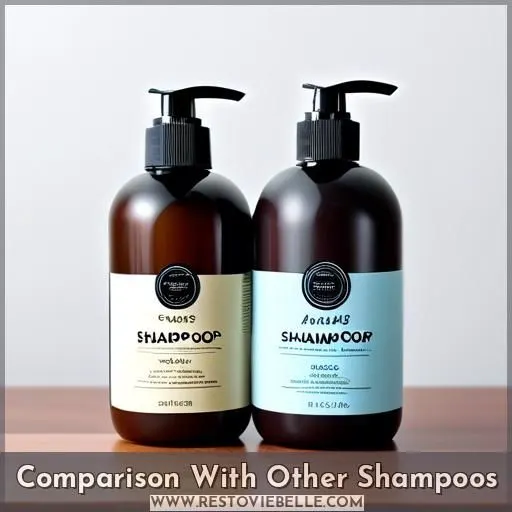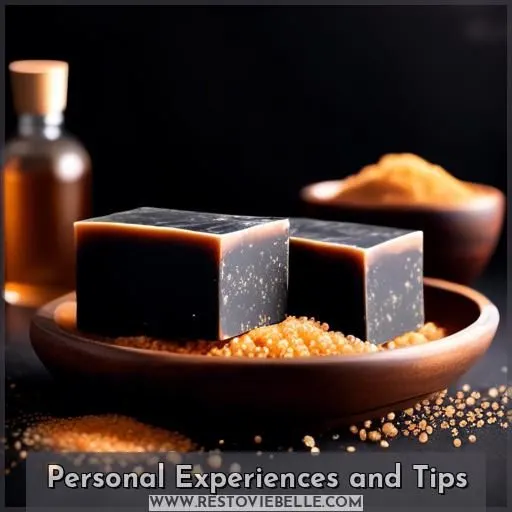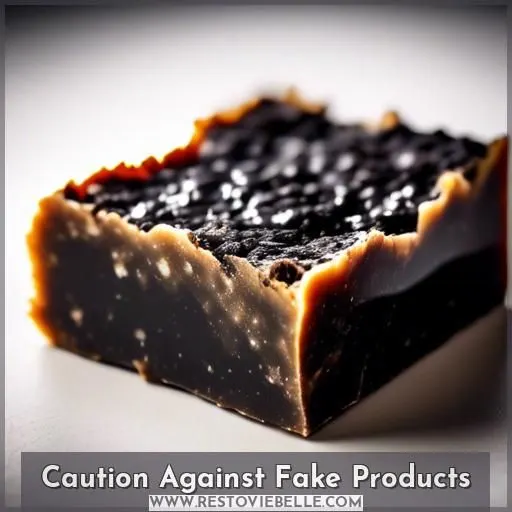This site is supported by our readers. We may earn a commission, at no cost to you, if you purchase through links.
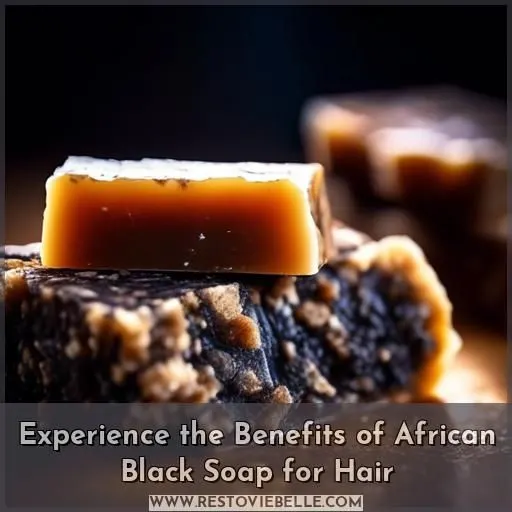
African Black Soap is a prevalent option for individuals aiming to enhance their hair health. It replenishes the scalp, shields hair with antioxidants, and encourages wholesome growth through its nutrient-packed formula. To guarantee genuineness, seek handcrafted products from Ghana or other African nations, made with all-natural components, and devoid of harsh chemicals. The soap should exhibit a somewhat brown hue and a malleable texture.
For usage, amalgamate warm water and soap shavings, then incorporate oils for hydration and a baomint oil blend for scalp invigoration. This soap delicately cleanses the scalp without eliminating natural oils, preserves hair moisture, and fosters thicker, more durable hair. In comparison to sulfate shampoos, African Black Soap is sulfate-free and bestows more advantages.
Individual encounters and pointers can provide further insights, but exercise caution regarding counterfeit products that may not yield the anticipated benefits.
Table Of Contents
- Key Takeaways
- Benefits of African Black Soap
- Identifying Authentic African Black Soap
- Recipe for Liquifying African Black Soap
- Clarifying and Moisturizing Effects
- Promoting Healthy Hair Growth
- Comparison With Other Shampoos
- Personal Experiences and Tips
- Caution Against Fake Products
- Frequently Asked Questions (FAQs)
- Conclusion
Key Takeaways
- African Black Soap is beneficial for hair health, offering nourishment to the scalp, antioxidant protection, and essential vitamins for hair growth.
- To ensure authenticity and effectiveness, look for handcrafted African Black Soap from Ghana or other African countries, made with all-natural ingredients and free from harsh chemicals.
- For application, liquefy the soap with warm water and soap shavings, then enhance it with your favorite oils and a baobab oil blend for additional hydration and scalp stimulation.
- Compared to sulfate shampoos, African Black Soap is sulfate-free, providing a gentler cleanse that preserves natural oils, maintains moisture, and promotes thicker, healthier hair growth.
Benefits of African Black Soap
African Black Soap is renowned for its benefits on natural hair, including nourishing the scalp, being rich in antioxidants, and providing vitamins for hair growth.
Nourishes the Scalp
African black soap isn’t just a cleanser; it’s a scalp savior. Its natural ingredients work like a charm for scalp exfoliation, ensuring your hair’s foundation is as healthy as it can be. This leads to improved moisture retention and hair growth, making your scalp a fertile ground for lush locks.
Imagine it as a superhero, swooping in to nourish your scalp, banish inflammation, and kick scalp conditions to the curb.
Antioxidant Rich
African Black Soap not only nourishes the scalp, but also teems with antioxidant properties. These antioxidants shield your hair from harm, fostering scalp well-being and diminishing hair loss.
Essential oils such as baomint oil blended into the soap amplify these benefits, invigorating the scalp and quenching the hair’s thirst.
By employing African Black Soap for your natural hair care regimen, you guarantee radiant, healthy tresses that hold moisture and defy excessive dryness.
Vitamins for Hair Growth
Vitamin deficiencies can contribute to hair loss. A lack of vitamin D, for instance, can result in dry, brittle hair that breaks easily and moderate to excessive shedding and thinning hair. Iron deficiency anemia can also lead to hair loss, as the hair follicle requires iron for growth, and an iron deficiency can disrupt the hair growth cycle. Zinc, another essential mineral, is essential in hair tissue growth and repair, and a deficiency can lead to hair loss that’s often reversible once the deficiency is addressed. Vitamin E is important for healthy skin and hair, and a deficiency can cause poor scalp health, which might impact hair growth. Biotin, also known as vitamin B7, is often associated with hair and nail health, and a deficiency can cause hair thinning and loss, although severe biotin deficiency is rare in individuals who consume a typical Western diet.
To address hair loss caused by vitamin deficiencies, incorporating a balanced diet rich in vitamins and minerals is critical. Foods like fatty fish (a source of vitamin D), eggs (a source of biotin), lean meats (a source of iron), and nuts (a source of zinc) can contribute to healthier hair. If dietary changes aren’t sufficient, supplements or medical interventions may be necessary to address the deficiency and prevent further hair loss.
Identifying Authentic African Black Soap
To identify genuine African Black Soap, seek handcrafted and natural products. Authentic African Black Soap is typically made using time-honored methods, such as roasting plantain leaves to create the soap. It should be dark-black or light-brown in color, with a slightly rough texture and a natural, earthy fragrance.
It may also contain natural ingredients like shea butter, almond or Argan oil, Aloe-leaf gel or juice, and other beneficial additives. Real African Black Soap is free from harsh silicon and aluminum oxide, synthetic pigments, and artificial scents. It may be slightly uneven in appearance and have a softer consistency.
To confirm authenticity, check the ingredient list for plant ash, which is the primary ingredient in traditional African Black Soap. Avoid products with unnatural black dyes, polished surfaces, and hardening agents.
Handmade and Natural
Concerning genuine African black soap, multiple factors can assist in its identification. Initially, it’s crucial to recognize that this soap is handcrafted, frequently in Ghana or other African nations. The ingredients employed are generally plant-based, incorporating natural oils and plant-derived alkalis. The soap possesses a brownish-gray-black hue with noticeable flecks of shea butter, plant ash, and oil. It shouldn’t include a complex list of chemical ingredients, as these aren’t typical of its traditional origins.
Culturally, African black soap holds great significance, with its history tracing back to pre-colonial Yoruba times. It has been utilized for ages for its skin-enhancing properties, including evening skin tone, reducing hyperpigmentation, and alleviating psoriasis. Currently, it’s widely popular, notably on social media, where influencers attribute their clear skin to its use.
Regarding environmental impact, authentic African black soap is produced using sustainable practices, often adhering to fair trade ethics. This supports local communities and guarantees ethical sourcing. Economically, it presents a natural alternative to soaps containing chemicals, offering a more sustainable option for consumers.
Color and Texture Indicators
To verify the authenticity of African Black Soap, consider the color and texture indicators. Authentic soap should be slightly brown and have a soft texture that can be broken by hand. It shouldn’t be black or hard. These indicators guarantee the soap is handmade, natural, and of high quality.
Recipe for Liquifying African Black Soap
To liquify African black soap for use on your hair, you’ll need the following:
- Warm water
- Soap shavings
- Your favorite oils
- A baomint oil blend
Fill a jar with warm water and add the soap shavings. Then, add your chosen oils and the baomint oil blend. Stir the mixture until the shavings have dissolved, then let it sit for 1-2 hours.
This recipe will help:
- Clarify your scalp
- Maintain its natural pH
- Thicken your hair
- Retain moisture
- Prevent overdrying
Warm Water and Soap Shavings
To liquify African black soap for natural hair, you’ll need warm water and soap shavings. Start by filling a jar with warm water. Next, cut African black soap shavings into the jar. The texture of the soap should be soft, so it can be easily dissolved in the water. Once the soap is added, let it sit for 1-2 hours to fully dissolve.
When preparing the soap, consider the water quality. Use distilled or filtered water to avoid introducing impurities that could affect the soap’s quality. Additionally, store the soap in a cool, dry place to maintain its texture.
When using the soap, you can add your favorite oils to enhance its moisturizing properties. Baomint oil blend is a great choice for stimulating the scalp and hydrating your hair. Choose 3 oils that suit your hair type and preferences, such as jojoba oil, coconut oil, and olive oil.
Adding Oils for Moisture
To enhance the moisturizing properties of your homemade African black soap, you can add your favorite oils. These oils will help nourish your scalp and hydrate your hair. Here’s how you can do it:
- Fill your jar with warm water.
- Cut your African black soap shavings into small pieces and add them to the jar.
- Add your preferred oils to the jar. You can choose from a variety of oils, such as coconut oil, olive oil, or jojoba oil.
- Add the baomint oil blend to the jar.
- Stir the mixture until the soap shavings are dissolved.
- Let the mixture sit for 1-2 hours.
Baomint Oil Blend for Scalp Stimulation
Baomint oil blend is a key ingredient in the recipe for liquifying African black soap. This oil blend is a DIY remedy for scalp stimulation and hair growth. By adding baomint oil to your soap mixture, you can enhance the benefits of African black soap for your hair. Here’s what you need to know:
- Scalp Stimulation: Baomint oil stimulates blood flow to the scalp, promoting hair growth.
- Hydration: Baomint oil is rich in hydrating properties, which helps to retain moisture in your hair.
- Natural Oils: Combining baomint oil with your favorite oils enhances the moisturizing effect of the soap.
- Hair Care: Baomint oil blend is a natural addition to your hair care routine, providing a holistic approach to hair health.
Clarifying and Moisturizing Effects
African black soap is a popular choice for natural hair care due to its clarifying and moisturizing effects. It gently cleanses the scalp without stripping it of its natural oils, which helps maintain a healthy pH balance. At the same time, the soap’s moisturizing properties retain hair moisture, preventing overdrying and promoting thicker, more resilient hair.
The soap’s antifungal, antibacterial, and antiviral properties also contribute to its ability to clarify the scalp and promote hair growth.
Clarifies Scalp Without Stripping
Essential for maintaining healthy hair is purifying your scalp without removing its natural oils. African black soap is a game-changer, as it purifies the scalp without altering the pH balance. This gentle cleansing process allows your natural oils to work their magic, fostering moisture retention and promoting hair growth.
By incorporating this soap into your hair care regimen, you’ll experience enhanced scalp health and hydrated locks.
Moisturizes and Retains Hair Moisture
Embrace the moisturizing prowess of African Black Soap! This natural ingredient clarifies your scalp, fostering scalp health and hair elasticity. By incorporating it into your hair care regimen, you’ll experience enhanced moisture retention and product integrity, even for those with highly porous hair.
Promoting Healthy Hair Growth
African black soap can stimulate your scalp and thicken your hair, leading to healthier hair growth. By using this soap in your hair care routine, you can experience the benefits of this natural ingredient for your hair.
Stimulates Scalp
African black soap is both a clarifying agent and a scalp stimulator. It helps to reduce scalp inflammation, dandruff, and itchiness. By stimulating the scalp, it promotes healthy hair growth, preventing hair breakage and dryness. This makes it an ideal choice for those seeking to maintain a healthy scalp and promote hair growth.
Thickens Hair
African black soap is a popular choice for natural hair enthusiasts seeking to promote healthy hair growth. This traditional soap, made from locally harvested plant ashes, has a rich heritage and cultural significance. It offers several benefits that contribute to thicker hair and improved hair growth. Here are three key benefits of using African black soap for hair:
- Nourishing Follicles: African black soap is rich in vitamins and minerals that nourish the hair follicles, promoting healthy hair growth. These nutrients help to strengthen the hair and encourage new growth.
- Increased Blood Circulation: African black soap is known to increase blood circulation in the scalp, which can stimulate hair follicles and promote hair growth. This enhanced blood flow guarantees that the hair follicles receive the necessary nutrients and oxygen to support healthy hair growth.
- Antioxidant and Antimicrobial Properties: African black soap contains antioxidants and antimicrobial agents that protect the hair from damage and promote a healthy scalp environment. These properties help to maintain the health of the hair follicles, which is essential for healthy hair growth.
To incorporate African black soap into your hair care routine, you can try the following recipe:
- Warm Water: Fill a jar with warm water.
- African Black Soap Shavings: Cut African black soap shavings into the jar.
- Oils: Add baomint oil blend and your three preferred oils.
- Stir: Stir the mixture to dissolve the soap shavings.
- Let Sit: Let the mixture sit for 1-2 hours or until the shavings are completely dissolved.
Comparison With Other Shampoos
When contemplating shampoo choices for natural hair, it’s imperative to discern the distinctions between sulfate shampoos, sulfate-free shampoos, and African black soap. Sulfate shampoos have the potential to desiccate hair and remove protective lipids, making them inadvisable for Afro-textured hair.
Conversely, sulfate-free shampoos employ milder cleansing agents that retain natural hair oils and preclude dryness. This makes them a more suitable option for natural hair.
African black soap, on the other hand, provides nourishment to the scalp and fosters healthy hair growth. However, it lacks pH balance and may cause dryness or color deterioration if not employed judiciously.
Sulfate Shampoos Vs. Sulfate-Free
Sulfate shampoos are known for their powerful cleansing abilities, but they can also strip the hair of its natural protective lipids, leading to dryness. In contrast, sulfate-free shampoos use milder cleansing agents like coco glucosides, which help preserve the hair’s natural oils and prevent dryness.
Sulfate-free shampoos also adjust the pH to be more acidic, which is particularly beneficial for Afro-textured hair. By choosing sulfate-free shampoos, you can maintain the health of your scalp and hair, ensuring moisture retention and promoting a balanced pH.
Black Soap Vs. Conventional Shampoos
When weighing African black soap against conventional shampoos, consider this: regular shampoos might play it too rough, stripping your hair’s natural swagger and leaving it high and dry. African black soap, on the other hand, is the gentle guardian of your hair’s pH balance, nurturing growth without the drama of color fade or hair damage.
It’s the unsung hero for your hair’s health.
Personal Experiences and Tips
Drawing from years of utilizing African black soap for both hair and skin, the evidence underscores its significant benefits. If you have thin, fine hair, incorporating this natural product into your routine could offer transformative results, as shared in personal experiences and tips.
Years of Use for Hair and Skin
For years, I’ve used African black soap for both my hair and skin, and I can’t get enough of its benefits. This soap is widely available and affordable, making it a staple in my beauty routine. I’ve found that it nourishes my scalp, stimulates hair growth, and retains moisture.
The versatility of African black soap is unmatched, and its safety is well-established. It’s no wonder I’ve been an enthusiastic user for eight years and counting.
Advice for Thin, Fine Hair
After years of nourishing both hair and skin with African Black Soap, it’s evident that it’s a game-changer for thin, fine hair. Here’s how to harness its full potential:
- Opt for a liquid formula to gently cleanse without overburdening your locks.
- Focus on scalp care to foster a healthy growth environment.
- Use sparingly—less is more for fine strands.
- Embrace natural oils for a moisture boost without the grease.
Caution Against Fake Products
When weighing the option of using African black soap for your hair, it’s imperative to be wary of counterfeit products. Authenticity is essential for unlocking the advantages of this nourishing, antioxidant-rich soap.
Identifying Fakes
When it comes to utilizing African Black Soap, it’s essential to verify that you’re using the genuine article. Authentic African Black Soap is produced in Ghana using customary African formulations and methods, and it comprises natural elements such as palm kernel oil, plantain peel ash, coconut oil, shea butter, and cocoa pods.
To steer clear of counterfeit goods, scrutinize the following indicators:
- Handmade in Ghana or other African nations
- All-natural elements
- Somewhat brown hue
- Pliable texture that can be shattered by hand
- Inspect the ingredient enumeration for authenticity
If you’re acquiring from a retail establishment, inquire about the country of provenance and the specific ingredients employed in the soap. Exercise caution regarding items that are black in coloration and possess a rigid texture, as these are frequently indications of bogus African Black Soap.
Importance of Authenticity for Benefits
To experience the full advantages of African black soap for hair, it’s essential to use genuine, authentic African black soap. Here are five reasons why authenticity is important:
- Nourishing Scalp: Authentic African black soap is rich in natural oils and glycerin, which nourish the scalp and promote healthy hair growth.
- Antifungal and Antibacterial Properties: Real African black soap contains antifungal and antibacterial properties, helping to maintain a healthy scalp and prevent infections.
- Moisturizing Effects: Authentic African black soap is infused with ingredients like shea butter and cocoa butter, which moisturize the hair and scalp, preventing dryness.
- Soothing Properties: The natural ingredients in authentic African black soap, such as aloe vera, lime, and camwood, offer a soothing touch to the scalp, reducing itchiness and inflammation.
- Easy Wash-off: Real African black soap has an easy wash-off quality, leaving no residue behind, ensuring a clean and fresh feel with every use.
To guarantee you’re using authentic African black soap, look for handmade, natural products with a slightly brown color and a soft texture. Check the ingredient list for authenticity and avoid products with added dyes, fragrances, or harsh chemicals. By using genuine African black soap, you can enjoy the full range of benefits for your hair and scalp, including improved scalp health, moisturized locks, thicker hair, increased moisture retention, and reduced dryness.
Frequently Asked Questions (FAQs)
How often should African black soap be used?
To ascertain the most suitable frequency of using African black soap for hair, take into account the particular requirements of your scalp. For hair that isn’t unusually dry or oily, using African black soap 1-2 times a week is typically adequate.
For an oily scalp, 2-3 times a week may be helpful. If you have a dry scalp, use African black soap less often (1-2 times a week) to prevent potential excessive dryness.
If you have a sensitive scalp, begin with a lower frequency and adjust as your hair adapts. Always conduct a patch test before using African black soap to check for sensitivity.
Can African black soap cause allergic reactions?
Yes, African black soap can cause allergic reactions due to its natural ingredients, like plantain ash, which might ruffle your skin’s feathers if it’s on the sensitive side.
Is African black soap suitable for all hair types?
African black soap may be appropriate for different hair types, but it’s crucial to select the suitable formulation for your specific requirements. Consider soaps that indicate their compatibility with your hair type and scalp condition.
Authentic African black soap is generally handcrafted in West African nations, and it’s all-natural, with a slightly brown color and soft texture. Genuine soaps shouldn’t be black in color or have a hard texture. Acquire from reliable sources to make certain you’re obtaining the real thing.
How to store liquified African black soap?
To store liquified African black soap, wrap it up preferably in a paper bag or similar and place it in a dark place away from any kind of heat or sunlight. You can also store it in an airtight container and place it in a dark area.
In the shower, store the black soap in a dry soap dish or surface. Avoid leaving your black soap in water or moisture if you want your soap to last. Leaving the soap in water or moisture will dissolve it or make it every soft. You can also store your soap wrapped in a towel.
Depending on the size of your soap, it will be wise to cut them into the size you want before storing. This will make it easier for you to store. Black soap will get harder with time so cutting it before storing saves you time.
Can African black soap be used on dyed hair?
African black soap can be used on dyed hair, but it’s crucial to use it sparingly and dilute it with water to prevent harming the hair color. The oils in the soap can help moisturize the scalp and prevent dryness, which is beneficial for dyed hair.
However, it’s advisable to use a sulfate-free shampoo or a shampoo specifically designed for dyed hair to maintain the color’s vibrancy.
Conclusion
Embrace the transformative power of African Black Soap for your hair. This nourishing, antioxidant-rich formula, handcrafted with natural ingredients, can rejuvenate your scalp, retain moisture, and stimulate growth.
By opting for authentic, sulfate-free black soap, you’ll experience a gentle cleanse, thicker strands, and a healthier, more vibrant look. Don’t let counterfeit products diminish your expectations – seek out the authentic product and unleash the full potential of this remarkable soap for your hair.

